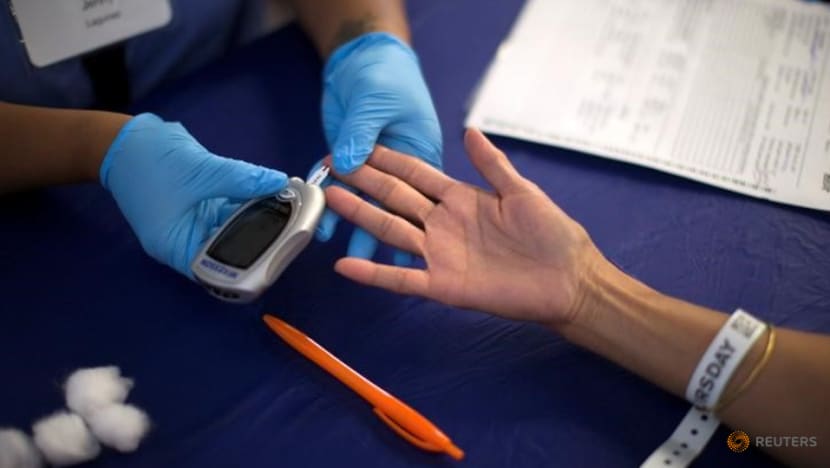commentary Commentary
Commentary: Unable to look sideways? Unusual signs of diabetes often unnoticed, ignored or denied
Some diabetics may not display common symptoms, making it a silent, dangerous disease, says Chairman of Healthway Medical Group's Medical Board Philip Koh.

(Photo: Unsplash/Victorien Ameline)
SINGAPORE: A patient once consulted me because his eyes could not look sideways.
He was surprised when I said we needed to check his blood glucose level, as part of routine medical tests, as this symptom could suggest diabetes as a possible cause.
And just as I suspected, his subsequent test results revealed he had diabetes.
Diabetes, as a condition where the body produces insufficient insulin resulting in high blood sugar levels, can give rise to a wide array of acute and less commonly talked-about but related complications such as blindness and kidney failure.
In this man’s case, his diabetes had damaged blood vessels and nerves, and paralysed muscles in his eyes that control eye movements. He recovered after a few months after receiving treatment and practising ways to place his diabetes under control.
Many people like him have seen me for complaints seemingly unrelated to diabetes, including multiple episodes of skin abscesses, numbness in their fingertips and blurring vision. They did not exhibit any common symptoms and yet were eventually diagnosed as diabetics.
A DREADED DISEASE
In his 2017 National Day Rally speech, Prime Minister Lee Hsien Loong highlighted diabetes as a serious national problem facing Singapore. While the disease is well-known and often cautioned about, the increasing frequency of its diagnoses paints a sobering picture.
Today, one in nine Singaporeans has diabetes. This figure is three in 10 or those over 60. In 2014, about 440,000 Singapore residents aged 18 years and above had diabetes, and this number is estimated to grow to 1 million in 2050.
As a family physician for more than 20 years, I have diagnosed my fair share of diabetes patients.
But like what Mr Lee mentioned in his speech, one main challenge dealing with this dreaded disease is it hardly has any clear symptoms in its early stages, and often presents itself in many diverse and surprising ways.
READ: Not just sugar: You might be eating your way to pre-diabetes and not even know it

Patients might ignore early symptoms and simply go on with their lives despite experiencing discomforts like increased fatigue, or attribute these to other reasons like stress at work or the hot weather.
Common symptoms include increased thirst, unexplained weight loss and tiredness – signs that often go unnoticed as patients do not feel sick and consult a doctor. Years could go by before one finds out about their condition.
The body is also very adaptable to change, meaning diabetes can be silent because symptoms only show after significant damage has been inflicted.
Without early diagnosis, medical intervention and proper management, diabetes can eventually lead to disabilities and other life-threatening diseases even though it is not fatal in the short term.
Many with diabetes also suffer from high cholesterol and high blood pressure. If they smoke, diabetes compounds their risks of heart attack, stroke and kidney.
Those who suffer from diabetes may experience substantial organ damage by the time they start treatment, owing to diabetes remaining undetected for years.
PREGNANT WOMEN AT RISK
Pregnant women would do well to heed caution where gestational diabetes afflicts many non-diabetic pregnant woman, usually in the second or third trimester of pregnancy.
About 10 per cent of pregnant women suffer from this condition. Raging pregnancy hormones increase as the pregnancy advances and counteract the action of insulin.

Thankfully, it can be discovered during the early pregnancy screening, and insulin injections can keep the pregnancy viable.
But gestational diabetes poses risks to both foetus and mother, including greater risks of early labour or premature birth and low blood sugar in the baby soon after birth.
Both mother and child also face increased chances of developing diabetes later in life.
POTENTIAL DIABETICS IN SELF-DENIAL
The most worrying segment of diabetics are those at high risk but also in huge denial even when they experience glaring symptoms of this disease.
I have met many overweight and obese patients who continue to make unhealthy lifestyle choices and live lives of inactivity, despite having a family history of diabetes, which increases their susceptibility to the disease.
So many engage in excessive eating and lead sedentary lifestyles, without any effort to exercise.
READ: Just because you're thin doesn't mean you're healthy, a commentary
A 2016 study led by the National University Hospital and Janssen Pharmaceuticals, found that Asians are more prone to Type 2 diabetes than our Western counterparts.
Asians are more prone to develop diabetes at much lower levels of obesity because they are unable to mount an appropriate insulin response to a glucose load, the study shows.

READ: Love of food, lack of activity leave Singaporeans vulnerable to diabetes, a commentary
READ: Why are we so afraid to talk about obesity? A commentary
Furthermore, Singapore’s rapid development has led to changes in our daily lifestyles – causing the average Singaporean to become less active and eat more high-caloric diets. Both these habits further exacerbate the risk of obesity, and consequently, diabetes.
LIVING WELL WITH DIABETES
Despite all this, the prognosis isn’t all bad. Even though diabetes can present itself in surprising ways, the disease can be managed and controlled once detected.
I was impressed with one patient’s commitment in changing his lifestyle that allowed him to lose 10kg of his initial bodyweight of 75kg in one year.
The patient, Mr Chan, managed it by waking up one hour earlier every day to go for brisk walks, cutting out all sweet drinks, replacing his favourite roti prata breakfast with a slice of wholemeal bread, and cutting down his rice intake.
Today, Mr Chan is on just one basic medicine for his diabetes, and has it well under control.
READ: Let's exercise ownership over our health, not wait for illness to set in, a commentary
Having diabetes is not a death sentence. It is more like a life sentence.
Most diabetics can live comfortably without suffering the dire complications of diabetes by making sensible healthy food choices, committing to regular exercises, and adhering to daily medicine.
But early detection is a critical first step and being mindful it can manifest in many ways should give us cause to be more vigilant.
Dr Philip Koh is Chairman of the Medical Board of Healthway Medical Group. He is also a Family Physician who practices at Healthway Medical Tampines Clinic.















